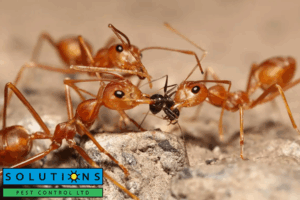Black ants are one of the most common pests homeowners encounter. Though often harmless, these ants can quickly become an inconvenience when they invade your home in large numbers. Whether you’re dealing with a minor issue or a full-blown infestation, understanding how to identify and eliminate black ants is key to keeping your home pest-free. In this ultimate guide, we’ll walk you through everything you need to know about black ants, from identification to effective elimination methods.
What Are Black Ants?
Black ants, also known as carpenter ants or pavement ants, depending on the species, are commonly found both indoors and outdoors. While most black ants are not dangerous and do not bite, some species can cause structural damage or be a nuisance when they invade homes in search of food or shelter. If you’re wondering do black ants bite, it’s important to know that although most species don’t, certain types like carpenter ants can bite when provoked. There are two main types of black ants homeowners typically encounter:
1. Carpenter Ants
Carpenter ants are larger and more destructive. These ants typically invade homes in search of moist wood, where they establish nests and begin tunneling through the material. They don’t eat wood but excavate it to create their nests, which can lead to significant structural damage over time.
2. Pavement Ants
Pavement ants are much smaller and are typically seen forming large colonies on sidewalks or in cracks in pavements. These ants are less destructive than carpenter ants but can invade homes in search of food and water, becoming a nuisance inside.
How to Identify Black Ants
Identifying black ants is essential for proper treatment. While most ants are relatively small and black, their behaviors, nesting habits, and size can help you determine what type you’re dealing with.
Size and Color
- Carpenter Ants: Carpenter ants are larger, typically ranging from 0.25 inches to 0.5 inches in length. They are usually black but can sometimes appear red or brown. Their thorax is smooth and rounded, and their antennae are bent.
- Pavement Ants: Pavement ants are smaller, typically about 0.1 to 0.2 inches in length. They are dark brown or black with a segmented body and distinct grooves along their thorax.
Nesting Habits
- Carpenter Ants: Carpenter ants prefer to nest in decaying wood, such as beams or logs that have been exposed to moisture. Their nests can be found in walls, windowsills, or even furniture.
- Pavement Ants: Pavement ants nest in cracks in sidewalks, driveways, and beneath concrete slabs. They can enter homes through small gaps around doors, windows, and pipes.
Behavior
- Carpenter Ants: Carpenter ants are nocturnal and typically avoid human contact. However, if they are near a food source or nesting area, they may become more active during the day.
- Pavement Ants: Pavement ants are often seen in large numbers around food sources like crumbs or sugar. They are highly attracted to grease, sugar, and protein.
Do Black Ants Bite?
While most black ants are harmless, some species, particularly carpenter ants, can bite. Carpenter ants are known to bite humans when provoked, but their bites are generally not dangerous. The bite may cause temporary redness, swelling, or mild discomfort, but it rarely leads to severe reactions.
Pavement ants, on the other hand, do not bite humans. They are primarily focused on finding food and building their nests. However, a large infestation of pavement ants can become a nuisance due to their overwhelming presence in your home.
Why Are Black Ants in Your House?
There are several reasons why black ants in house may invade your home. These ants are constantly on the lookout for food, shelter, and moisture, and your home offers all three. Some of the most common reasons for an infestation include:
- Food Sources: Ants are particularly attracted to sugary or greasy substances. If food is left out on countertops or if crumbs are not cleaned up, ants will quickly find their way into your home.
- Moisture: Black ants are drawn to moisture. Leaky pipes, bathrooms, and kitchens provide the ideal conditions for ants to thrive. Carpenter ants, in particular, are attracted to damp wood and may nest in areas with water damage.
- Shelter: As temperatures drop, ants will seek shelter inside homes. Your walls, foundation, and attic spaces provide ample space for ants to nest and build colonies.
How to Get Rid of Black Ants
If you’re dealing with an ant infestation in your home, the key is to identify the type of ant and then use effective elimination methods. Here are some proven ways to get rid of black ants:
1. Seal Entry Points
The first step to controlling any ant infestation is to prevent them from entering your home. Check for cracks around doors, windows, and walls. Seal these entry points using caulk or weatherstripping to prevent ants from coming inside.
2. Clean Up Attractants
Ants are always searching for food, so maintaining cleanliness in your kitchen and dining areas is crucial. Wipe down counters, sweep floors, and keep food stored in airtight containers. Avoid leaving crumbs or spills unattended, as these can attract ants.
3. Use Ant Baits
Ant baits are an effective way to control black ants. The worker ants consume the bait and carry it back to the colony, where it eliminates the entire nest. Baits are especially effective for pavement ants and other small species.
4. Use Natural Remedies
If you prefer non-toxic methods, several natural remedies may help deter black ants:
- Vinegar: Mix equal parts vinegar and water in a spray bottle. Spray the solution around ant entry points to repel them.
- Cinnamon: Cinnamon is known to repel ants. Sprinkle cinnamon around entry points or areas where ants are active to create a natural barrier.
- Diatomaceous Earth: This natural substance can be sprinkled around ant trails and nests. It works by drying out the ants’ exoskeletons, ultimately killing them.
5. Professional Ant Control
If the infestation persists or if you’re dealing with carpenter ants that may be damaging your property, it’s time to call in the professionals. An exterminator Surrey can assess the situation and implement a long-term solution to eliminate ants from your home.

Prevention Tips to Keep Black Ants Away
Once you’ve dealt with an ant infestation, it’s important to take steps to prevent future invasions. Here are some helpful prevention tips:
- Regularly inspect your home for signs of ants and seal any new cracks or gaps.
- Keep Your Yard Clean: Trim back trees and bushes, as overhanging branches can provide easy access for ants to enter your home.
- Address Moisture Issues: Fix leaks and ensure that your home is well-ventilated to reduce the chances of attracting moisture-loving ants, such as carpenter ants.
About Solutions Pest Control
At Solutions Pest Control, we specialize in providing effective and eco-friendly pest control Surrey BC solutions to homes and businesses in the Surrey area. Whether you’re dealing with black ants in your house or need help with ant control near me, our team of experts is ready to assist you. We understand the importance of keeping your home pest-free, and we offer customized solutions tailored to your specific needs.


